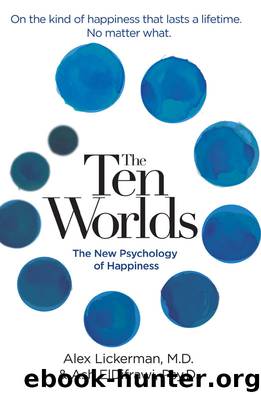The Ten Worlds by Alex Lickerman

Author:Alex Lickerman
Language: eng
Format: epub
Publisher: Health Communications, Inc.
Published: 2018-04-14T16:00:00+00:00
Hedonic Adaptation
But what about the principle of hedonic adaptation, the tendency over time for our attachments to lose their power to bring us joy? Doesn’t joy, in fact, satiate, too? In point of fact, no. Hedonic adaptation happens, yes, but not because over time our attachments lose their power to make us feel joy. It happens because over time our attachments stop commanding our attention.
As Daniel Kahneman writes in his book Thinking, Fast and Slow, “Adaptation to a new situation, whether good or bad, consists in large part of thinking less and less about it. In that sense, most long-term circumstances of life, including paraplegia and marriage, are part-time states that one inhabits only when one attends to them.”20 This is why when we take the time to pause and ask ourselves if a particular attachment—even one we’ve possessed for years—still brings us joy, we usually find that it does. And if for some reason we can’t tell or don’t think that it does, we only need to be threatened with its loss to discover the truth. For nothing brings our attention back to an attachment and teaches us how much we still value it more than the possibility of losing it.
It also seems as if our attachments bring us less joy with the passage of time because our attachments don’t only bring us joy. They can also bring us pain and suffering. For example, a mother may not immediately be able to access the joy she gets from her children if they’re misbehaving at the moment she’s asked to focus on it. (It may be easier to recognize that joy doesn’t satiate when we examine the joy we get from our pets, which tend not to frustrate us nearly as much as our children do.)
Finally, because hedonic adaptation doesn’t occur as a result of feeling joy itself but rather as a result of our tendency to think less about our attachments over time, it occurs for different attachments at different rates for different people. For example, though studies show that on average people return to their baseline level of hedonic happiness within two years of getting married, there exists a large variation among individuals. After getting married, some people come to a higher level of hedonic happiness that never returns to its premarital baseline.21
Download
This site does not store any files on its server. We only index and link to content provided by other sites. Please contact the content providers to delete copyright contents if any and email us, we'll remove relevant links or contents immediately.
Rewire Your Anxious Brain by Catherine M. Pittman(18620)
Talking to Strangers by Malcolm Gladwell(13332)
The Art of Thinking Clearly by Rolf Dobelli(10381)
Mindhunter: Inside the FBI's Elite Serial Crime Unit by John E. Douglas & Mark Olshaker(9298)
Becoming Supernatural by Dr. Joe Dispenza(8186)
Change Your Questions, Change Your Life by Marilee Adams(7718)
Nudge - Improving Decisions about Health, Wealth, and Happiness by Thaler Sunstein(7678)
The Road Less Traveled by M. Scott Peck(7574)
The Lost Art of Listening by Michael P. Nichols(7476)
Mastermind: How to Think Like Sherlock Holmes by Maria Konnikova(7304)
Enlightenment Now: The Case for Reason, Science, Humanism, and Progress by Steven Pinker(7288)
Win Bigly by Scott Adams(7171)
The Way of Zen by Alan W. Watts(6578)
Daring Greatly by Brene Brown(6487)
Big Magic: Creative Living Beyond Fear by Elizabeth Gilbert(5726)
Grit by Angela Duckworth(5576)
Ego Is the Enemy by Ryan Holiday(5392)
Men In Love by Nancy Friday(5218)
The Laws of Human Nature by Robert Greene(5136)
